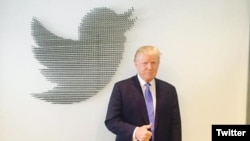Earlier this week, Donald Trump warned on Twitter that he would reverse the current U.S. warming of relations with the Cuban government if Havana doesn't give Washington a "better deal."
The tweet was short and to the point. It took just 138 characters to outline what would be a major reversal of U.S. foreign policy toward the communist-ruled country. No video or other link was included explaining what a "better deal" entailed.
It wasn't the first time that Trump or his advisers have threatened to undo President Barack Obama's two-year-old detente with Cuba — the Trump campaign has for months taken a hardline stance on the longtime U.S. foe.
But it was the first time Trump announced a significant foreign policy statement via Twitter, his preferred social media network, since being elected president.
As a presidential candidate, Trump upended American politics in part through his unconventional use of Twitter. At all hours of the day, Trump would send out 140-character-long outbursts, sometimes launching fiercely personal attacks on political opponents and, at other times, simply offering unfiltered commentary on the controversy of the day.
For Trump's supporters, this from-the-gut communication style has appeal — if you went to one of his rallies, it was almost certain you'd hear someone praise Trump for "telling it like it is." And Trump, a billionaire businessman, has defended his rhetoric, arguing that taking extreme positions is part of his negotiating style.
But diplomats say that kind of erratic messaging, if continued during Trump's presidency, would pose a unique challenge to those trying to conduct foreign policy, and could lead to miscommunication, or worse.
"We've never really confronted a potential like this before — certainly not in the administrations I've worked for," said Aaron David Miller, a Middle East negotiator under three different U.S. administrations.
Miller, now a vice president at the Wilson Center, calls Trump's campaign behavior "unprecedented," though he is quick to point out that there's no guarantee that President Trump will continue to tweet like presidential candidate Trump.
"We really have no idea," he said. "It's one of those situations where there's a lot of unknowns."
Issue of brevity
Part of the issue is the abbreviated nature of Twitter.
"In 140 characters you cannot make a coherent, thorough argument," noted Kathleen Hall Jamieson, who specializes in political communication and public policy at the University of Pennsylvania. "You can telegraph things, but you can't do much beyond that."
Communicating important matters of foreign policy via tweet increases the risk that a message is misinterpreted, Jamieson says. That's why, under current norms, presidential communications are carefully crafted or vetted by those with specific policy expertise.
"They look at not only the precise meaning, but whether the meaning can be inadvertently mistranslated as it moves from one language to another," Jamieson explained.
It's not as if Twitter, which was started in 2006, is an altogether new form of communication for presidents.
President Barack Obama, the first U.S. president to take office in the age of social media, has also embraced Twitter, Facebook and other social networks.
But Obama's Twitter account, like that of many other world leaders, is run by his staff, and the president himself only rarely issues personal statements through it. Obama's tweets also have mainly focused on domestic affairs, leaving the State Department and its social media accounts to communicate foreign policy.
"Once [Trump] gets into office, are you going to have foreign policy run via Twitter or via the State Department?" asked Ron Christie, who was an adviser to former President George W. Bush and former Vice President Dick Cheney.
Christie says it's important for a president to use social media, but says Trump should follow Obama's example and let staff run those accounts.
"I would hope that some senior member of his staff who's served a president before would impart upon him the seriousness of his words, and how significantly those words resonate, not only here but around the world," Christie said. "Because as president, people will watch every sentence of every paragraph of every statement that you issue, and they're going to try to derive meaning from it."
Playing to fantasy
Trump's aides have given no indication that he will dial back the rhetoric anytime soon, instead portraying the president-elect's raw communication style as a positive.
"I think that one of the great things about the president-elect is he is going to voice his opinion," Jason Miller, Trump's transition team communications director, told Fox Business Network on Tuesday. "When he has something to say, he's going to say it and people are going to know it."
But Trump, who has had enormous success as a businessman, has also touted his unpredictability, saying one of his best rhetorical tools when it comes to negotiations is "truthful hyperbole."
"I play to people's fantasies," Trump wrote in his 1987 book “The Art of the Deal,” which details how he likes to make exaggerated statements in part to manipulate the press and keep his rivals guessing.
Will Trump attempt to use “The Art of the Deal” tactics in international relations? And is his Twitter account a part of that? Nobody really knows, except Trump.
And Miller, the former Mideast diplomat, says it's futile to engage in speculation about how it will play out.
"The ultimate pivot occurs on January 21," Miller said. "You can analyze all the trend lines you want and put together a composite picture of what a president-elect will be like or how he or she might behave, but the ultimate test is in the doing."





